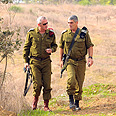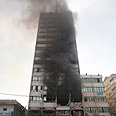
Gantz and Southern Command chief Tal Russo
Photo: IDF Spokesperson's Office

IDF strike in Gaza
Photo: EPA
IDF chief to commanders: Don't just fire at random houses
Figures compiled by Intelligence Directorate point to significant drop in number of medium, long-range missiles fired by Palestinian terrorists on sixth day of Operation Pillar of Defense; attempts to shoot down IAF aircraft continue on daily basis
The sixth day of Operation Pillar of Defense
was characterized by a significant drop in the number of rockets fired at Israel,
massive damage caused to the medium and long-range missile launching pads and growing military alertness against a potential "fusillade" on Hamas'
part ahead of a truce declaration, IDF officials said Monday.
Meanwhile, PR efforts continued to present final preparations ahead of a potential ground offensive in the Gaza Strip.
Related stories:
- Gazans mourn civilians killed in IDF strikes
Another Ashkelon school hit as Cairo truce talks continue
Most Americans back Israel's Gaza operation
IDF Chief of Staff Benny Gantz toured the southern region during the day, and told division commanders in the area: "I ask that you pay attention not to just take random houses and fire at them unnecessarily."
The chief of staff added, "I haven't seen, I don't know and I haven't encountered a mission that the Golani Brigade hasn't succeeded in, and I assume I am not facing one now. You'll do what I tell you to do."
According to figures compiled by the IDF Intelligence Directorate, the past 24 hours saw a drop of dozens of percentage points in the number of rockets fired at Israel – 151 compared to 245 in the previous day of fighting.
The bombings of more than 900 launching pads in the Strip led, according to those figures, to a significant drop mainly in the number of rockets fired to a range of 25-45 kilometers from Gaza.
The Palestinian launching cells suffered a serious blow as well. Attempts to fire rockets were also made from the coastal area in Gaza, but the army stressed the Palestinians' relatively low number of hits (5%) on constructed Israeli areas.
Video courtesy of jn1.tv
According to estimates in the defense establishment, the Hamas movement wishes to end this round of fighting, which it did not want the first place. In recent weeks, its leaders tried to shorten the exchanges of fire with Israel as much as possible and avoid dragging the IDF into an operation.
According to the same estimate, the rocket fire from Gaza will grow stronger as the decision on a ground offensive or ceasefire draws closer. Accordingly, Hamas' attempt to reach a significant achievement – a "victory image" of an Air Force aircraft being shot down or a rocket hitting Tel Aviv – will grow.


_wa.jpg)



So far, the Air Force has identified daily attempts to hit its aircraft by firing shoulder missiles. The threat, which was only theoretical in the past, led to a renewed emphasis of the policy of flying over the Strip and to an improvement of defense systems.
The political developments announcing a possible truce did not stop the rocket fire targeting southern communities and the IDF's strikes in Gaza. Air raid sirens sound frequently and a number of rockets and mortar shells were located in open areas. The Iron Dome system intercepted rockets fired at Beersheba.
By Monday evening, according to the IDF, 1,128 rockets and mortar shells had been launched from the Strip, 641 of them landing in Israel, 37 rockets hit constructed areas, 121 rockets landed on Palestinian territory, and the Iron Dome system intercepted 324 rockets. The IDF had attacked 1,350 targets in Gaza.
While a state official in Jerusalem said that Hamas was "looking for a way to save face," the movement's politburo chief Khaled Mashaal claimed that the Israeli political echelon had asked for a lull via Western countries.
"There are Egyptian and Qatari efforts," he said. "We meet every day, but we won't accept any Israeli condition. If they are asking for a ceasefire, they must stop the fire and aggression," he said.
The many airstrikes in the Strip, which have also led to the killing of Palestinian civilians, were executed, according to the army, with an attempt to limit the number of civilian casualties as much as possible.
Army officials noted that before every strike, civilians are asked to stay away from the targeted areas, stressing that in some cases strikes were called off after "uninvolved" residents were spotted in the area.
The airstrike which killed the al-Dalu family members was also looked into by the army, and initial findings revealed that there was no information on their presence in the area, which would have prevented their death.
- Follow Ynetnews on Facebook and Twitter
- Receive Ynetnews updates
directly to your desktop















